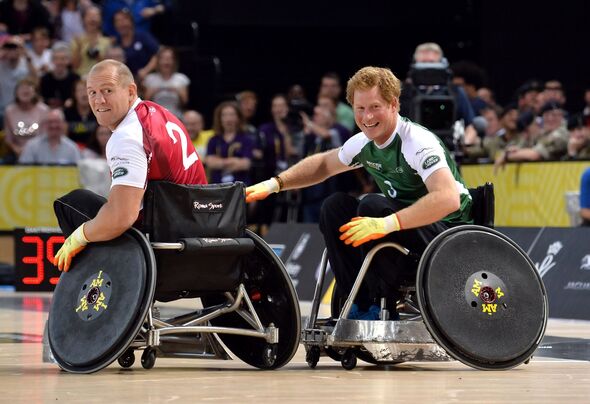Image Credit: Daily Express
Mike Tindall, a former rugby world champion and royal family member, has played a pivotal role in championing the Invictus Games. As a platform that celebrates resilience, rehabilitation, and the indomitable spirit of wounded, injured, or sick servicemen and women, the Invictus Games is a cause close to Tindall’s heart. While the public often sees the glitz and inspiring stories of the games, there is a hidden challenge in ensuring the legacy of this monumental event continues to thrive.
This article delves into the complexities and behind-the-scenes efforts Mike Tindall faces in his mission to uphold the legacy of the Invictus Games.
Read More: Prepare for the Chill: Arctic Blast Weather Forecast Met Office Explained
Building a Sustainable Legacy
The Invictus Games were founded by Prince Harry in 2014, and Mike Tindall has been a staunch supporter since its inception. Tindall’s role goes beyond being a figurehead; he actively participates in advocacy, fundraising, and connecting with participants. However, sustaining a legacy requires more than enthusiasm. It demands:
- Financial Stability: Securing long-term funding is one of the most significant hurdles. The games rely on sponsorships, donations, and partnerships to operate. Tindall’s challenge lies in convincing corporations and individuals to contribute consistently.
- Expanding Awareness: Although the Invictus Games have a global audience, there is always a need to reach new demographics. Tindall’s efforts in promoting the event through media appearances and social campaigns are crucial in keeping the Games relevant.
- Balancing Growth with Mission: As the Games expand, there is a risk of diluting their core purpose. Tindall’s role includes ensuring that growth aligns with the mission of honoring and supporting veterans.
Advocacy for Mental Health and Rehabilitation
One of the most profound impacts of the Invictus Games is its focus on mental health. For many participants, the journey to the Games is not just physical but deeply emotional. Mike Tindall’s advocacy shines in this area, as he openly discusses the importance of mental well-being for veterans and their families.
Challenges in Mental Health Advocacy:
- Stigma: Despite growing awareness, mental health remains a taboo topic in many communities. Tindall’s challenge is to break down these barriers and encourage veterans to seek help.
- Resources: Ensuring that participants have access to post-Games support is a critical issue. The Invictus Games aim to be more than a one-time event, offering long-term programs for veterans. Tindall’s influence is vital in driving these initiatives forward.
Nurturing Community Connections
Another hidden challenge is maintaining a sense of community among participants. The camaraderie fostered during the Games is a powerful healing tool, but sustaining it after the event is a complex task. Tindall’s efforts include:
- Supporting Alumni Programs: Initiatives that keep past participants connected are essential for ongoing support and motivation.
- Creating Networking Opportunities: By organizing events and platforms for veterans to share their experiences, Tindall helps build a strong, supportive network.
- Encouraging Public Involvement: Bringing in the public to celebrate and support veterans helps integrate them into broader societal frameworks, reducing feelings of isolation.
Overcoming Media and Public Perception
While the Invictus Games are celebrated globally, there is an ongoing challenge in keeping the narrative fresh and impactful. The media can sometimes oversimplify the Games as a feel-good story, overlooking the depth of the participants’ struggles and triumphs. Tindall’s role involves:
- Highlighting Diverse Stories: Ensuring the media covers a wide range of experiences, from lesser-known athletes to behind-the-scenes volunteers.
- Combating Stereotypes: Breaking down the notion that all veterans fit a single mold. The Games’ participants come from diverse backgrounds, and Tindall works to showcase this diversity.
A Personal Commitment
For Mike Tindall, the Invictus Games are more than a public role. His genuine connection to the cause stems from a deep respect for those who serve. Tindall has often spoken about the inspiration he draws from participants and how their stories of perseverance impact his own outlook on life.
Balancing Roles:
As a member of the royal family and a public figure, Tindall balances multiple responsibilities. His commitment to the Invictus Games is a testament to his dedication, but it also comes with sacrifices. Time management and personal investment in the cause are ongoing challenges that Tindall navigates with grace.
Looking to the Future
The legacy of the Invictus Games depends on continual innovation and adaptation. Mike Tindall’s vision includes:
- Expanding Accessibility: Ensuring the Games are open to more participants from around the world.
- Leveraging Technology: Using digital platforms to connect participants, share stories, and reach wider audiences.
- Strengthening Partnerships: Collaborating with organizations that align with the Games’ mission to provide comprehensive support for veterans.
FAQs
What is Mike Tindall’s role in the Invictus Games?
Mike Tindall is an advocate and supporter of the Invictus Games. He participates in fundraising, promoting the event, and connecting with veterans to highlight their stories and struggles.
Why is the Invictus Games legacy important?
The legacy of the Invictus Games ensures that the platform continues to support veterans and raise awareness about their challenges, particularly in areas like rehabilitation and mental health.
How does Mike Tindall address mental health challenges?
Tindall advocates for breaking the stigma around mental health and ensuring participants have access to resources and ongoing support after the Games.
What are the biggest challenges in sustaining the Invictus Games?
The primary challenges include securing long-term funding, maintaining public interest, expanding the Games while preserving their mission, and providing post-event support for participants.
How can the public support the Invictus Games?
The public can support the Games by donating, attending events, volunteering, and spreading awareness about the cause and its significance.



Leave a Reply